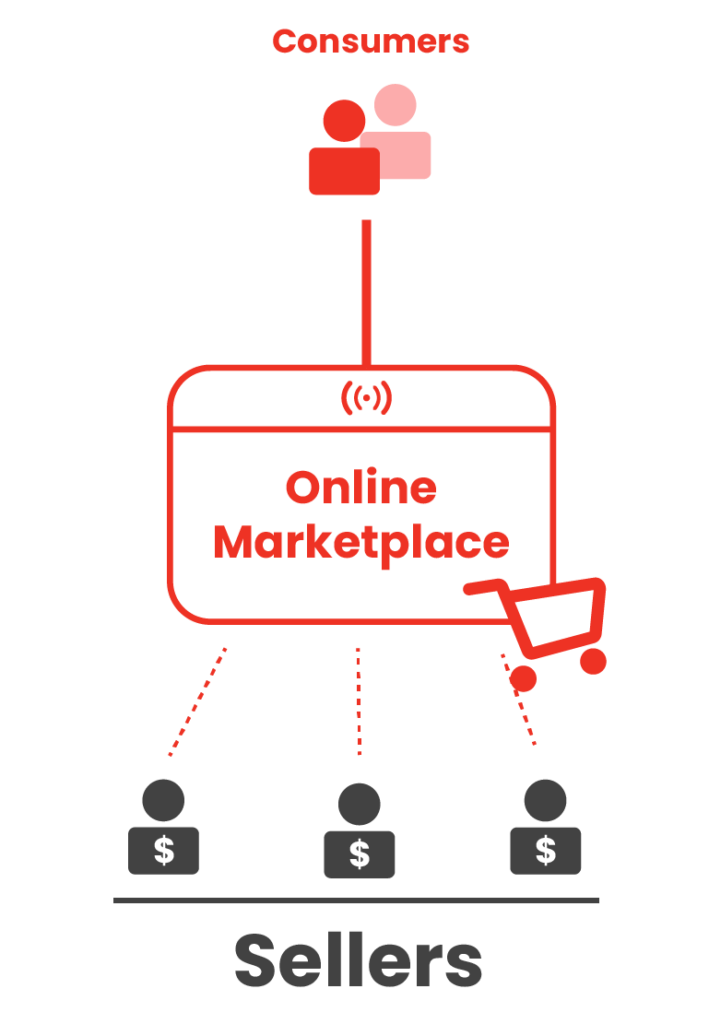 Unlock New Revenue Potential With Marketplace Solutions
Unlock New Revenue Potential With Marketplace Solutions
By Logicbroker | June 21, 2022
In this evolved ecosystem, gone are the days when retailers had to abide by marketplace behemoths like Amazon, eBay, and Rakuten. Building your own or connecting to [international] marketplaces can increase your revenue, maximize your sales potential, and tap into new revenue potential.
eMarketer found that U.S. eCommerce marketplaces sales will reach a record $358 billion in 2022. This growth makes up nearly 40% of all eCommerce sales and has largely been dominated by Amazon, eBay, and several international marketplace staples like Rakuten.

What Is A Marketplace?
An online marketplace is a website, app, or eCommerce ecosystem that serves as a host to multiple sellers. The marketplace operator provides a place for sellers to offer their inventory and facilitate the transactions. It’s up to the onboarded sellers to fulfill each order. eBay is the best-known example of a site that’s purely a marketplace. Amazon is the largest marketplace, although Amazon holds its own inventory of products as well.
Building Your Own Marketplace
With the advent of advanced, cloud-based APIs and headless commerce, creating your own marketplace to host a variety of products that appeal to your targeted audience’s preferences is no longer a daunting task. In a traditional, monolithic model, an organization’s frontend—what the consumers see—was locked to their backend—what their developers use to modify their website. In modern-day programs, frontends are decoupled from your organization’s backend and are instead linked together through API technology, giving your organization the freedom to create unique customizable user experiences.
Headless Commerce is one of the many key driving forces behind advanced marketplace solutions. Decoupled systems give your organization the freedom to constantly evolve your online marketplace to whatever your sellers, customers, and, ultimately, your own organization need to stay ahead of your competition.
So, what are the advantages of an online marketplace with advanced, headless commerce processes for consumers?
One-Stop Shop
One of the biggest advantages of marketplaces for consumers is simply the convenience of a blended basket. The newest buzzword in the eCommerce space, blended baskets are a unique opportunity for major retailers to capitalize on their target customers’ needs. A blended basket is a consumer’s online shopping cart that consists of products from many different sellers, all purchased through one marketplace. If you are shopping for a computer, going to five stores for a monitor, mouse, and keyboard can be frustrating. A comprehensive marketplace with a variety of sellers delivers a convenient one-stop shop and can help build trust, reliability, and repeat sales with a consumer all while keeping them active on your website. For sellers, marketplaces give them an opportunity to showcase their product’s advantages over the competition.
Curated Selections
In a similar vein, an online marketplace gives your organization the ability to tailor your selection of goods for specific target demographics. While marketplaces like Amazon are “catch-all” marketplaces, retailers like Samsung and Best Buy have built eCommerce hubs that feature a curation of only their sellers’ most trusted products, ensuring a great consumer experience each visit, and strengthening their brand.
Adapting To Rising Trends
The internet moves quickly. Trends change and products fall in and out of fashion with consumers faster than ever before. Marketplaces, coupled with advanced eCommerce technology, allow retailers and brands to quickly add new sellers, products, or offers to their marketplaces. Once those products are featured, advanced analytical tools can provide insight into how your vendors are doing, what can be improved, and what products need to be removed or promoted.
Consumer Confidence
Online marketplaces also offer consumers unique insights into product reliability. While on the backend the operator sees how vendors and products are performing, the frontend of an online marketplace usually has impartial reviews made by consumers, for consumers. These reviews help you decide which products need to be removed or promoted while increasing consumer confidence that the products have been thoroughly vetted by both the consumer and the operator.
Tapping Into Backend Advantages
These consumer-facing, frontend advantages are just the tip of the marketplace iceberg. For retailers looking to build their own marketplace, or sellers looking to connect with various marketplaces, there are many backend advantages as well. Learn about all of the backend advantages marketplaces have to offer in our blog post.
Modern dropship & marketplace solutions have never been so easy.
Are you ready to drive growth and gain unparalleled speed to market with a modern, scalable dropship or marketplace program? Fill out the form below to get in touch with our team:

